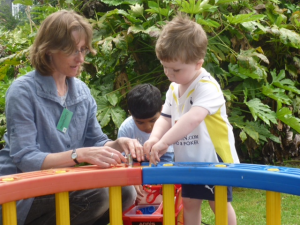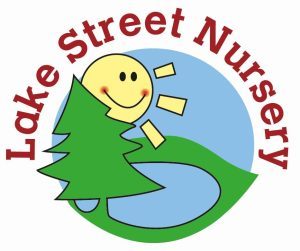 The curriculum is planned using the Early Years Foundation Stage. We follow a simple routine consisting of a free choice of activities and experiences inside and out, snack time, more choosing time inside and out, Music and Movement, and then group time with stories and singing.
The curriculum is planned using the Early Years Foundation Stage. We follow a simple routine consisting of a free choice of activities and experiences inside and out, snack time, more choosing time inside and out, Music and Movement, and then group time with stories and singing.
The room is divided into small zones including two, homely Key Bases where children can spend time with their key person and inside there is also a construction area, small world, a messy area and a slide. There will usually be one adult led activity each day inside and out, while other activities will be designed for children to use more independently but with an adult nearby to offer support and encouragement. The routine offers children structure and security.
Key Person
 Our key person system is there to provide each child with a special person they can settle with and who can get to know them really well. The key person will be responsible for co-ordinating any records of your child’s achievements and favourite activities. They will feed this information into the team’s planning of activities and experiences at Nursery.
Our key person system is there to provide each child with a special person they can settle with and who can get to know them really well. The key person will be responsible for co-ordinating any records of your child’s achievements and favourite activities. They will feed this information into the team’s planning of activities and experiences at Nursery.
All our staff are experienced in child-care and more than half are trained to at least a Level 2 child care qualification. Our Mananger has Early Years Professional Status: a Level 6 professional qualification in child education and has a Post Graduate Certificate in early childhood. There is at least one member of staff with a current First Aid Certificate available each session. Our staff are our greatest resource and we have an ongoing programme of staff development and training.
There are a minimum of four members of staff per session. Ratios are maintained and often exceeded at the statutory ratios of 1:4 for 2 year olds and 1:8 for 3 year olds. Our parent/carer help rota helps to provide extra support, and we may also have other support staff working with the children as well as a number of regular volunteers and occasional student placements across the year.
Our key person system is central to the way Nursery works: this provides each child with a member of staff (sometimes a team of two staff across the week) who is special to them each session. Each member of staff plans for their small group of key children, welcomes and settles them each morning and spends time getting to know the child and their family. The nursery key person system is one of its strengths and the majority of staff have attended training in the key person system.
Curriculum, Observation, Assessment and Planning
Children learn best through play and experience and when they are settled and happy. The Early Years Foundation Stage provides the framework for the planning. This is a statutory framework for children from birth to the year of their fifth birthday.
Activities and experiences are based around the ages and stages, preferences and skills of the children.
 In accordance with good practice, staff observe the children, taking written notes and photographs. Notes are made about each child’s development and the activities that they enjoy.
In accordance with good practice, staff observe the children, taking written notes and photographs. Notes are made about each child’s development and the activities that they enjoy.
Special paintings or craft activities may be kept and added to a portfolio which records their progress. Parents may view these notes at any time and they will be given to you when your child leaves the setting. These notes help create a picture of each child’s development and achievements and assist the team to plan for every child, taking account of each child’s special interests and favourite activities.
The staff meet weekly to review progress and to plan ahead. Each child’s key person will make time to talk to families about their children’s progress. More information about the curriculum and the learning that takes place through play can be found on the notice boards.
Three times a year summative assessments are made of each child’s progress, within the EYFS, using Development Matters. Development Matters sets out steps indicating typical progress for children within age bands and across seven areas of development: Physical Development, Communication and Language, Personal, Social and Emotional and four secondary areas: Maths, Literacy, Understanding the World and Expressive Arts and Design. These assessments help staff track children’s progress to ensure that the activities and experiences provided assist the children in their development and can help highlight any areas of difficulty for children that may benefit from additional support.
Behaviour
 We want the children at Nursery to grow in confidence and self-esteem. The ethos at the setting is to praise achievement and encourage an atmosphere of respect, cooperation and sharing. The adults lead by example and support children in their play and in recognising and dealing with feelings and emotions.
We want the children at Nursery to grow in confidence and self-esteem. The ethos at the setting is to praise achievement and encourage an atmosphere of respect, cooperation and sharing. The adults lead by example and support children in their play and in recognising and dealing with feelings and emotions.
We aim to provide enough resources so that young children are not drawn into unnecessary conflict in their play. Difficult behaviours are analysed and children given support to make amends for antisocial behaviours and to begin to understand the effect their behaviour can have on others. All staff regularly attend training in Promoting Positive Behaviour.
Our Behaviour Policy is available if you would like more information.
Security and Safety
 The main door to is kept locked during session time, with the outer door to the building being locked from 9.45. The garden has secure fencing and the children are only allowed outside with supervision. Children will only be sent home with the nominated carer.
The main door to is kept locked during session time, with the outer door to the building being locked from 9.45. The garden has secure fencing and the children are only allowed outside with supervision. Children will only be sent home with the nominated carer.
If someone else is to collect your child please notify the Manager.
Fire drills are practiced regularly throughout the year and indoor and outdoor safety checks carried out daily.
Equality and Diversity
We are an equal opportunities employer and aim to foster an environment where all cultures are respected and welcomed. We seek to promote and reflect the diversity of our society in the resources and activities and in the behaviours and attitudes expressed.
Nursery promotes the universal values of respect, justice, the rule of law, rights of the individual and democracy expressed in a variety of ways in the way we work with the children, alongside their families, to support them in their learning and behaviour.
For further information please see our Equality and Diversity Policy and our British Values Policy.
Outdoor Learning
At nursery we have a large and diverse garden, and outdoor learning is an integral part of how we help our children learn and develop. Please click on the link below to read our leaflet. We go outside each day in all weathers and support the children to dress appropriately as part of their learning. Many children learn better in an outside environment and there are opportunities for all areas of learning outside. We take an Eco-Literate approach, using a variety of natural resources to support learning and experience.
Rhyme of the Week
Each week Nursery has a new rhyme or song of the week. We say or sing this each day at group times. Songs and rhymes are great for communication and language development. Often our rhymes relate to the time of the year or a topic e.g. winter time, road safety, or they may relate to an area of learning such as maths or a song with lots of actions to support our developing physical skills. we include signs and actions to help everyone join in even if they have little english or spoken language.
Rhymes and songs are great ways to support small children in their language development: children quickly learn new rhymes and songs and using them gives lots of practise of listening to sounds – an early way to learn phonics – by hearing and repeating the sounds through song and rhyme.
There are many sites on the web where you can find children’s songs and rhymes. The BBC is a good starting point. We usually post the rhyme of the week on the parent board in the lobby.
School Readiness and Moving on to school
School readiness for us means developing skills to help children manage in their future education and life. These skills include: developing their sense of self and their self-esteem, being able to get along with others in their peer group and being able to approach adults (to ask for help for example). Other skills that are really helpful in life and in starting school are being able to manage clothes and being able to go to the toilet and wash hands independently as well as being able to understand and respond to a simple instruction when necessary.
We spend a lot of time at Nursery working on these skills, in developmentally appropriate ways, to enable children to be the best they can be and to be confident to move onto another setting when the time comes. We want to encourage the children to develop their curiosity in the world around them, be willing to have a go and to be excited about exploring and learning. In the EYFS these are known as The Characteristics of Effective Learning.
When the time comes for your child to move on to school: either to another Nursery class or into Reception we work closely with the next setting, whenever possible, to provide a smooth transition. This may include visits to local settings or visits here of staff from the nearby schools. We also have pictures of settings to share with the children and in the summer term we often run a special group time for those moving up so they can talk about what to expect and have time to express any concerns. Nursery then produces a ‘Transition Report’, shared with parents, to go to the child’s new teacher. Sharing some information about the child, their strengths and details of any help they may be receiving. This is to help each child make the best transition possible into a new setting.
The following resource link may be useful for those moving onto school….
